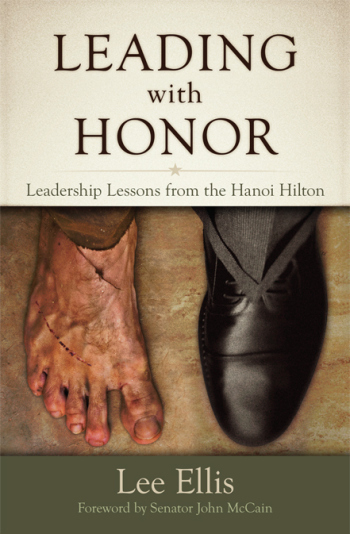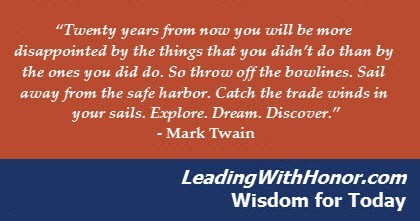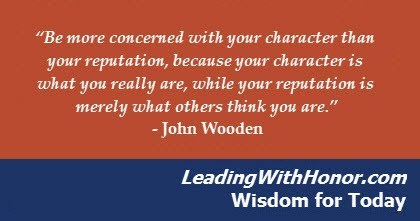Lee Ellis's Blog, page 307
May 13, 2015
Boosting Your Success Quotient: Four Ways to Discern the Emotions of Others
By Lee Ellis
The commercials on television today highlight treatments for low this and low that, but unfortunately we don’t hear much about low Emotional Intelligence (EQ). Here are some symptoms: You know you’re brilliant, yet you find yourself reacting with impatience and anger with others who just don’t get it. Maybe your feedback to a teammate failed to come across the way you had intended. If as a leader at work, at home or in your community you have any of these symptoms, you’re possibly suffering from low Emotional Intelligence (or Low EQ).
As we know, the natural behaviors of each person are unique and specialized. In addition to using behavioral assessments such as Leadership Behavior DNA that identify each team member’s natural behaviors, the key to good Emotional Intelligence is awareness of our emotions and those of others. Until we become personally aware of and accountable for our own emotions, we’re clueless as to how to manage them. Likewise, an awareness of the emotions of others helps us manage our response to facilitate the most effective interaction.
Let’s walk through the four steps of emotional intelligence.
Recognize your own emotions. You’re in a meeting and Bob says something that you “know” is absolutely wrong. Your first instinct is to publicly call him out and correct his error—but you’ve been down that road in the past. Fortunately, you recognize that you’re irritated and coach yourself to hold back on your response.
Manage your emotions. You’re a quick thinker and you remind yourself that Bob is a bright guy too. To show him respect, you could say something like, “Gee Bob, I had not thought of it like that before. Can you explain the logic of how that would work?” Of course, your tone of voice and body language are very critical because they reveal your true emotions. Once Bob gives his explanation, more than likely you will see that he’s just operating with a different perspective. In any case, you’ve managed your emotions and maintained your decorum—signs of good EQ.
Recognize the emotions of others. On the way back from the conference room, you run into a peer, Jen, who seems a bit down and overwhelmed. You’re depending on her to deliver the data that you need for the next step of your project and the deadline is tomorrow. Your immediate fear is that it’s not going to happen. Now that you’ve been working to raise your EQ, you mentally push back on your fear and consider what your teammate is up against and how her confidence and energy are sagging. It doesn’t take an EQ genius to realize that putting a guilt trip on her is probably not a good idea.
Respond appropriately/effectively to the emotions of others. Because you’re not fear-motivated, you focus on encouraging Jen. After all, she does good work and what she needs right now is an emotional boost. So you choose to show her some empathy and encouragement, telling her that you understand things are difficult right now and asking if there are ways that you and your team can help. You close out by reminding her that she is a great teammate, valuable in your company’s culture, and that you have confidence in her.
Having good EQ may sound somewhat soft, but it’s actually very powerful because it’s about being the most effective leaders possible. It begins with awareness; we can’t manage what we don’t recognize, and then it’s about managing our own emotions and our response to others. In the simplest terms, it’s about reading the situation and then acting in the most effective manner. It does get easier with practice, and it makes you the kind of leader that others want to follow. Try it and see for yourself.
LE
Related Resources:
Report Services – Leadership Behavior DNA
Training Services – Leadership Behavior DNA


May 12, 2015
Leadership FAQ – “What are some ways that I can gain better credibility by keeping my promises as a leader?”
Lee answers this Leadership FAQ – “What are some ways that I can gain better credibility by keeping my promises as a leader?”
Lee’s Answer in Seven Steps:
Be Intentional. If keeping your word is important to you, recommit to it as one of your key values. Test yourself and track how well you currently keep your promises.
Become More Self-Aware. Monitor your words and be fully aware of what you are promising.
Don’t Make Promises You Can’t Keep. Resist committing unless you’re sure you want to do it and can do it. Learn to say no, or say “I’ll have to check with my team to see if we can do that.”
Write Commitments Down Immediately. Assign them a completion date on your to do list or calendar.
Be Courageous. Use the Courage Challenge engagement card to engage rather than withdraw (see our website for details).
Ask Your Support Team to Help You be Accountable. Get over your independence and pride. Ask for help.
Fail Fast. If you can’t keep commitments, ask for relief immediately versus ignoring it.
From a practical perspective, keeping your word makes you look stronger and more authentic and that leads to greater trust, better outcomes/results, and a more successful life in every area. From a values perspective, your honor is at stake.
Please comment in this forum and/or share this list with other leaders!
Related Articles:
7 Leadership Steps That You Need to Know on Keeping Your Promises
Download the Honor Code from Leading with Honor


May 11, 2015
Leading with Honor – Special Spring Offer – Save 30% Off!
Take Lee Ellis on the road with you as he shares his dramatic Vietnam POW stories and practical lessons learned in the camps. These 14 principles have literally served to guide his 40+ year career as a military officer, leadership consultant, author, and subject matter expert.
We’re extending our special Spring offer through May! Save 30% off in our Online Store–just enter coupon code “Spring15″ when you checkout.
Click to shop and please share with others.


May 10, 2015
On This Day in Leadership History, May 10, 2015
On this day in leadership history in 1869, Central Pacific and Union Pacific Rail Roads meet in Promontory, UT. A golden spike was driven in at the celebration of the first transcontinental railroad in the U.S.
What a great reminder to celebrate and commemorate achievements in life and work! Stop for a moment and celebrate something, anything that was accomplished in your world.
Transcontinental Railroad – Wikipedia


May 8, 2015
Leading with Honor Wisdom for Today, May 8, 2015
���Twenty years from now you will be more disappointed by the things that you didn���t do than by the ones you did do. So throw off the bowlines. Sail away from the safe harbor. Catch the trade winds in your sails. Explore. Dream. Discover.��� ��� Mark Twain
May 7, 2015
How Does Your Leadership Stack Up Against These 28 Attributes? See Inside.
Who doesn���t want more freedom? We all do! What are the things that are holding you back from being the best, honorable leader in home and work? Download Lee���s ���Leadership Freedom Checklist��� and evaluate the 28 primary attributes of great leaders. And please share with others!


May 6, 2015
7 Leadership Steps That You Need to Know on Keeping Your Promises
By Lee Ellis
I had already broken three promises, and the day wasn���t over yet! I was participating in an event specifically on the topic of self-governance and reliable follow-through, and in the heat of the moment I made some commitments that I couldn���t keep. While they were small things that others may not have remembered, they still had the potential to undermine my credibility and dependability with this group. I realized that I needed to be more self-aware of what I was saying to others. I like to help people, look good, and to be liked so it���s easy for me to say that I���ll do something.
To this day, it was a learning opportunity that I haven���t forgotten.
Simple But Not Easy
When the Honor Code was created, Article 3 was a foundational requirement to lead with honor ���
���Keep your word and your commitments. Ask for relief sooner than necessary.���
It���s easy to assume that we keep our word, but in reality it���s not that easy to keep promises consistently���especially to remember and keep the ones that aren���t as personally important to us. We have good intentions and a desire to help and fulfill our word with a particular person, but the truth is that we hastily agree to do things that get forgotten and drop off the radar. Even worse, we just decide it was a bad commitment that we should���ve never agreed to do, and now we want to ignore it instead respectfully declining or asking for relief.
 On a national scale, have you noticed the cynicism toward politics and the media? Gallup���s research indicates that the majority of the population has ���very little��� or only ���some��� confidence in the institutions of congress, television news, and internet news. There appears to be widespread skepticism, even contempt for institutions that consistently fail to keep their promises and their value statements to the public. This mentality is collectively and individually dangerous if it becomes an accepted practice to break promises.
On a national scale, have you noticed the cynicism toward politics and the media? Gallup���s research indicates that the majority of the population has ���very little��� or only ���some��� confidence in the institutions of congress, television news, and internet news. There appears to be widespread skepticism, even contempt for institutions that consistently fail to keep their promises and their value statements to the public. This mentality is collectively and individually dangerous if it becomes an accepted practice to break promises.
Why Is It Important?
Others are counting on you to keep your word. They���re planning their work, their schedule, their expectations, their hopes, even their lives based on what you���ve promised. Their trust for you is founded on your reliability to follow through.
Trust is the hinge point of leadership���when it goes up, your credibility goes up; when it goes down, your influence drops like a rock. [Tweet This]
There will be consequences if you fail. When you don���t deliver, it can be a minor problem or even disastrous. What happens when a child is told that you will pick them up after practice and you don���t show? What about when you tell your teammates you will have your next milestone done by a certain date and then don���t come through?
In the military and other time-sensitive occupations, keeping your commitments can be life or death. Entire operations are coordinated around timely execution of the tactical plan. In day to day life, seemingly small, unfulfilled promises become critical over time to your credibility and your honor.
Ultimately, it undermines the trust of others and trust is the foundation for leadership, influence, execution, and healthy relationships. Let���s assume we all have some room to grow on this one.
7 Steps to Keeping Your Promises [Tweet This Article]
How can your guard against broken promises and commitments? Learn and apply this list of helpful, proven steps ���
1. Be Intentional. If keeping your word is important to you, recommit to it as one of your key values. Test yourself and track how well you currently keep your promises.
2. Become More Self-Aware. Monitor your words and be fully aware of what you are promising.
3. Don���t Make Promises You Can���t Keep. Resist committing unless you���re sure you want to do it and can do it. Learn to say no, or say ���I���ll have to check with my team to see if we can do that.���
4. Write Commitments Down Immediately. Assign them a completion date on your to do list or calendar.
5. Be Courageous. Use the Courage Challenge engagement card to engage rather than withdraw.
6. Ask Your Support Team to Help You be Accountable. Get over your independence and pride. Ask for help.
7. Fail Fast. If you can���t keep commitments, ask for relief immediately versus ignoring it.
From a practical perspective, keeping your word makes you look stronger and more authentic and that leads to greater trust, better outcomes/results, and a more successful life in every area. From a values perspective, your honor is at stake. Keep your commitment to live and lead with honor. Please also share your wisdom and experience in this forum.
LE
P.S. Want to see my monthly leading with Honor video coaching on this topic? It���s free���simply sign up to receive it in your inbox.
P.P.S. Download a complimentary of the The Honor Code based on the leadership lessons learned in Leading with Honor, and please share.
Related Articles:
– Honor Code Article 1 ��� Four Lies that All Leaders Are Tempted to Use, and How to Tell the Truth
– Honor Code Article 2 ��� Treating Others with Dignity and Respect Even When It���s Difficult: Four Leadership Traps to Avoid
http://www.gallup.com/poll/1597/confidence-institutions.aspx
May 4, 2015
Lee Ellis FAQ – “What was the impact having men around you as deep encouragers, given your POW situation?”
 Be encouraged! A Frequently Asked Question from Lee Ellis: ���In your POW experience, what was the impact of having men around you as deep encouragers, given the situation?���
Be encouraged! A Frequently Asked Question from Lee Ellis: ���In your POW experience, what was the impact of having men around you as deep encouragers, given the situation?���
Lee���s Answer: ���That was incredibly important. First of all, if you have never been alone in very difficult and scary circumstances, you don���t know what alone and scary is. You have no idea. Could you imagine being a prisoner of war in a communist country and you are locked up? You are alone and they are telling you that you will never go home and you are going to be tried for war crimes. You are helpless, so that situation when you are alone and helpless, other than your own will and attitude, having someone else around you is vital. We would risk our lives just to reach out to each other. When someone was alone, we would take great risk to reach out and encourage them because that is the worst place you could be.
One of the things I tell people today is that the Navy Seals never fight alone, fighter pilots try to never fight alone because when you are alone the odds go up against you. To keep your positive attitude, your energy, your fighting spirit whether you are in business or whatever it is in life, you need support. You need that fellowship around you that can encourage you and that can give wisdom and hold you accountable. Being alone is a dangerous place.���
Learn more about Lee Ellis and award-winning title, Leading with Honor: Leadership Lessons from the Hanoi Hilton.


May 3, 2015
On This Day in Leadership History, May 3, 2015
On this day in leadership history in 1937, Margaret Mitchell won a Pulitzer Prize for “Gone With The Wind.” Sixty Pulitzer Prizes in fiction were awarded before 1948. The final count for women fiction winners overall? 18. Ouch.
Our guess is that Margaret Mitchell never had the goal of winning a Pulitzer Prize as she poured her energy, talent, and creativity into Gone with the Wind. She simply believed in the process and saw it to the end.
Leaders (and especially women leaders)���if you���re in the midst of your process, keep pressing forward!
Margaret Mitchell – Wikipedia


May 1, 2015
Leading with Honor Wisdom for Today, May 1, 2015
���Be more concerned with your character than your reputation, because your character is what you really are, while your reputation is merely what others think you are.��� – John Wooden



















